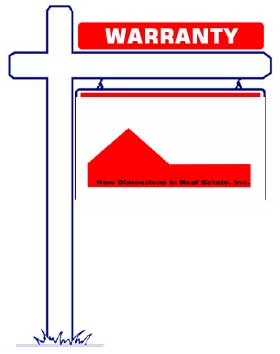Real Estate Buying Guide
AGENCY RELATIONSHIPS
The Laws of Agency can be very confusing. Until very recently, most real estate transactions involved two agents who legally worked for the party that was paying the commission and in most cases, this was the seller. Buyers, however, have the option to enter into a Buyer’s Brokerage Agreement that enables the real estate associate to work directly for the Buyer even though the agent may be compensated by the Seller in the transaction. Your associate will provide you with a detailed description of Agency which will outline your alternatives. This document is extremely critical and is a requirement of the Florida Real Estate Commission. If there is any confusion, you should seek legal advice.
HOME WARRANTY PLANS

There are several home warranty plans available in today’s real estate market. They are all different yet are very similar in the way they apply to homes. Warranties can be purchased by either the Buyer or the Seller. In those cases where the Seller purchases a Warranty Plan, the plan would cover those specified items within the home during the period the home is made available for sale. Such items are built-in appliances, hot water heater, plumbing, etc. Should they fail during the listing period, they would be eligible for repair or replacement with a small deductible owed by the Seller. The cost of the actual plan is paid at closing. In other words, no money is paid towards the cost of the plan until the property is sold and closes (except for any deductibles due on repairs during the listing period). The Seller plan has certain limitation that apply during the listing period, e.g., heater and air conditioner MAY NOT be covered items. They are usually covered for the Buyer after closing. Each plan is slightly different and therefore the plans should be read very carefully.
In the event a Seller elects NOT to provide a warranty, a purchaser can obtain one. The plan has the same deductible and covers the purchaser for up to one year after closing. Some of the plans have renewable options that may apply at the owners discretion. The actual provisions of the plan are too complex to list - read the policy carefully. If you have any questions, please consult your warranty provider. Once a Seller elects to participate in the program, the program CANNOT be negotiated out of any agreement to purchase.
A Home Warranty can help eliminate any hard feelings when a Buyer closes on a home and days or weeks later has a major appliance failure. Did the Buyer know or not know that it would fail? Statistics have shown that homes with warranties tend to get higher prices than homes without a warranty. Which one would you buy; a home with a warranty or a home without?
PREDICATED OFFERS
Oftentimes Buyers must sell a property in order to obtain sufficient cash to purchase your property. This may also apply to you in purchasing your next home. While predicated offers may required the selling of another property, they may also occur when “something” must happen before the actual sale can be consummated.
When this situation occurs, Buyers may submit an Agreement to Purchase with an “open” or “closed” predication clause. This simply means they agree to purchase your home at some future date BUT ONLY when their present home sells or some other event takes place (like liquidating bonds; insurance settlement, cashing in an IRA, etc).
An “Open” predication means your home will continue to be shown and marketed. In the event a subsequent offer is received, the original Buyer will be notified verbally and in writing and be asked to either remove the predication and proceed with the sale or to cancel the original purchase agreement, thus permitting you to sell your home to the second Buyer. Most predicated purchase agreements contain a 48 or 72 hour notification procedure meaning that the Buyer has 48 or 72 hours in which to remove the predication or cancel the agreement. These are commonplace.
A “Closed” predication means that you are to take your home off the market and agree not to consider any subsequent offers except in a “back-up” situation. Closed predication offers are rare.
A predicated offer tends to take someone who specifically wants to purchase your home “off the street and out of the market place”. In other words, they are not free to write an offer on another home unless they can get a release from your agreement. A predicated offer may assist you in negotiating a contract on your next home when there is already a tentative Buyer for your present home.
Buyers who have only a few days in which to make a buying decision oftentimes do not have sufficient time to wait the required number of days/hours for an answer and therefore do not look at homes with predications pending.
WHO PAYS FOR WHAT?
The following is provided for general information purposes only. This chart is based on who NORMALLY pays specific costs. X = Buyer or Seller; E = Either the Buyer or the Seller; and B = Both the Buyer and the Seller.
| ITEM | BUYER | SELLER |
|---|---|---|
| Down Payment | X | |
| Deposit | X | |
| Discount Points | X | |
| Origination Fee | X | |
| Loan Application Fee | X | |
| Appraisal Fee | E | E |
| Survey Fee | X | |
| Attorney Fee | B | B |
| Title Search/Abstract | X | |
| Recordation Fees | B | B |
| Lender’s Title Insurance | X | |
| Owner’s Title Insurance | X | |
| Homeowner’s Warranty Plan | E | E |
| Real Estate Commission | E | E |
| Termite Inspection | X | |
| FHA/VA Underwriting Fee | X | |
| VA Funding Fee* | X | |
| Homeowners Insurance | X | |
| Pre-Paid Taxes/Insurance | X |
Note (*) The VA Funding fee can actually be paid up front by either the Buyer or the Seller or the Buyer may “roll” the fee into the loan amount and pay it back over the life of the mortgage.








